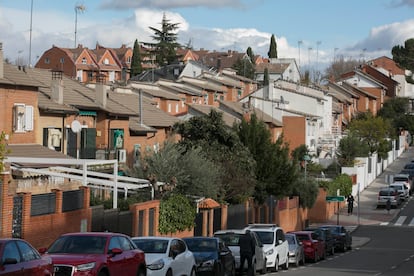The coronavirus exodus: Spaniards looking to buy larger homes outside the city
Demand for houses has skyrocketed as a result of the pandemic, with sales at record-high levels, according to the Notary General Council


“We didn’t realize how difficult it was to live in so few square meters until the lockdown,” says Javier M., a 35-year-old lawyer from Granada who lives with his wife in Madrid. When he talked to EL PAÍS at the beginning of December, the couple of “committed urbanites” were about to leave their 32 square-meter rental apartment in the center of the city and move to a 300 square-meter house in Villanueva de la Cañada, around 30 kilometers west of the capital. Javier is just one of many Spaniards who have decided to move to a larger home outside the city. Indeed, the coronavirus pandemic has led to a sharp rise in the sale of houses. Javier is pleased with the decision, explaining that his new house has “a room for remote working” and a “terrace where you can go outside.”
Clients are looking for much larger homes, with more light, that have a space to work remotely, balconies, gardensMar Herranz, sales manager of the real estate agency Engel & Völkers in Madrid.
Javier and his wife are not the only Spaniards who are looking for (and can afford) a larger house with a garden. Demand for detached, semi-detached houses and townhouses is defining the new normality of the real estate world. According to statistics compiled by the Notary General Council from notary offices across Spain, the sale of houses is at record-high levels. While the sale of apartments fell 0.1% in September and 13.9% in October, according to the latest data published this week, the sale of single-family homes is far above last year’s average, rising 25.9% and 13.2%, respectively.
The rise in sales has not escaped the attention of property developers or real estate agencies, especially given the current economic uncertainty. In October, 27.8% of all properties sold were stand-alone houses, up from 22.6% a year ago. “In June, when we began to come out [of the coronavirus lockdown], everything began to rise,” says Mar Herranz, a sales manager at the real estate agency Engel & Völkers in Madrid. She oversees properties in the northeast of Madrid, an area traditionally home to residential developments. In this area, detached house sales represented 80% of all property sales in the last few months. The remaining 20% are “attics or ground-floor apartments, which are also in demand,” she says.
Herranz is clear about what her clients now want. “They are looking for much larger homes, with more light, that have a space to work remotely, balconies, gardens… at the end of the day, the quality of life is better because there are more square meters and more open spaces,” she says. Herranz adds that a new type of client is now interested in buying a house outside of the city. “It’s not about changing one detached house for another,” she explains, in reference to the typical profile. “We have sold detached homes in the mountains to people who are leaving the center of the city.” Price is another important factor behind the move outside of the city. According to Herranz, the cost of a property is closely related to how close it is to Madrid. That said, the price of houses is falling less than all properties as a whole, recording a 2% drop in October, upon last year’s figures, compared to 4.7% for the latter, according to data from the Notary General Council.
A “solid” trend
“It’s clear that there has been a change in demand, although it’s too soon to quantify if it is going to be a permanent or circumstantial change,” says Mario Lapiedra, the property director general of Neinor Homes. “In the short term, it is a solid trend and it is going to last for the next five years,” he argues. That’s why his company, which has 1,000 detached houses in its portfolio, “is looking for land for this product.” Neinor Homes carries out market surveys to get a better understanding of what characteristics are considered most important to have in a home. According to the real estate agency, double the number of respondents now consider balconies and private spaces to be important.
It is not the only study that has highlighted this trend. A recent analysis by the real estate site Fotocasa shows that interest in property ads for single-family homes has skyrocketed between April and September, with respect to 2019. Requests to contact owners for more information have risen 86% for semi-detached houses in municipalities in the Madrid region and 30% in the province of Barcelona. And this phenomenon is not exclusive to Spain: “Homebuyers are increasingly looking for larger properties where they can work far from the city center,” reads the latest housing report from financial services company Moody’s. To underscore this trend, the report pointed to the connection between the sale of houses in the Paris metropolitan area and population density: the higher the concentration of people, the greater the fall in property sales in the first months of the pandemic.
According to Moody’s, the trend to move outside the city was present before the coronavirus pandemic, but has been accelerated by the health emergency. This, in turn, is likely to have driven up the sale of houses, which are not typically found in city centers. As Lázaro Cubero, the head of analysis at the real estate company Grupo Tecnocasa, explains: “One has to take into account that not all areas have this type of housing; in the cities of Barcelona and Madrid, the availability of this product is low.”
For Javier M. and his wife, it is clear that their priorities have changed. The lawyer recognizes that they don’t know anyone in their new neighborhood, but says: “We have more space for the price of a smaller apartment in Madrid; that’s what convinced us.”
English version by Melissa Kitson.
Tu suscripción se está usando en otro dispositivo
¿Quieres añadir otro usuario a tu suscripción?
Si continúas leyendo en este dispositivo, no se podrá leer en el otro.
FlechaTu suscripción se está usando en otro dispositivo y solo puedes acceder a EL PAÍS desde un dispositivo a la vez.
Si quieres compartir tu cuenta, cambia tu suscripción a la modalidad Premium, así podrás añadir otro usuario. Cada uno accederá con su propia cuenta de email, lo que os permitirá personalizar vuestra experiencia en EL PAÍS.
¿Tienes una suscripción de empresa? Accede aquí para contratar más cuentas.
En el caso de no saber quién está usando tu cuenta, te recomendamos cambiar tu contraseña aquí.
Si decides continuar compartiendo tu cuenta, este mensaje se mostrará en tu dispositivo y en el de la otra persona que está usando tu cuenta de forma indefinida, afectando a tu experiencia de lectura. Puedes consultar aquí los términos y condiciones de la suscripción digital.








































